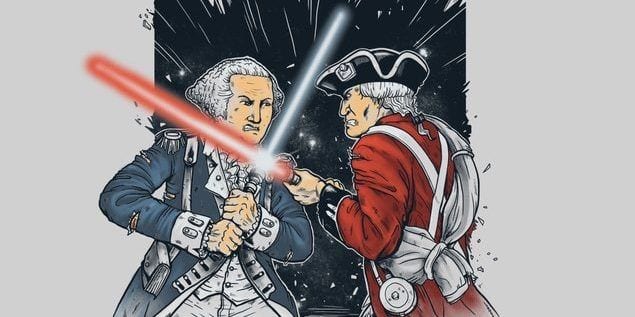Why he belongs in the American Canon.
Canon-Building is Nation-Building

More on the necessity of an American Canon.
A canon is a stick for measuring things with. That’s what the Greek word kanōn, cognate with the Hebrew kanna, means. When ancient Greek music theorists, for instance, wanted to mark out the locations on a string where the notes of the scale were played, they stretched the string along a plank of wood and made notches at the points where the most important harmonies emerged. That instrument was called the kanōn.
The first literary corpus ever described as a “canon” was the Bible. Early Christians referred metaphorically to the scriptures they deemed legitimate as a kanōn: a central set of texts which records what is reliable and indispensable, just as a measuring rod records what is basic and accurate.
That is why a literary canon neither should nor could be merely a list of the most enjoyable books. The books which make it up are usually enjoyable, to be sure. But they are not canonized because they are enjoyable: they are enjoyable because they speak with authority about some centrally important truth. Plenty of books, moreover, are excellent but do not speak with such authority. It is no slight to their excellence to say that it is not of the canonical sort.
For this reason, too, it matters that canons often have national or cultural adjectives attached to them: the Western Canon. The French Canon. The American Canon. It would be futile to try and list all the best books ever, full stop. The impossible enormity and fatal subjectivity of such a task is becoming painfully apparent as digital technology makes it feasible, at least hypothetically, to compile endless but indiscriminate databases of every keystroke ever struck. In the face of such limitless data, the questions which haunt us grow ever more basic and vexing: how do we organize all this? How do we keep track of everything important?
We cannot, and the wisest among us have never tried. That is why the Bible is not an exhaustive list of everything that Christians may profit from reading. It is an essential collection of everything Christians must read to know who they are. The books of the Bible tell us—through poetry, allegory, philosophy, history—what it has meant and should mean to be God’s people. The American Canon can teach us what it means to be the American people.
Canon-building, like nation-building, is therefore an exercise in identity formation. And just like nationhood, canonicity has been plagued of late with anxieties concerning its exclusivity, its self-serving bias, its chauvinism. Why delineate canons at all, if to do so is only to perpetuate the unmerited influence of a well-heeled elite?
This uncomfortable question has an equally uncomfortable answer. That prejudiced, insular, imperfect elite—those dead white men (mostly)—made our society what it is. And their influence is not, in fact, unmerited. We have no other America than the one they built, the one which, over time, has come to enfranchise more kinds of people than any other country on earth.
Those who object to the idea of an American or a Western Canon, who suggest that we refrain from teaching white male authors in schools so we can even up the scales, are ipso facto asking to scrap the American project and start over with a blank slate. Given the history of utopian movements, I am not sanguine about the prospects of such an effort. Far better, in my view, to get out the measuring stick and take stock of who we are.
To do so is not to freeze time or foreclose reform. To the contrary: an appetite for innovation and development is essential to the American spirit. After all, few American novels better express that spirit—few are more unquestionably canonical—than Mark Twain’s Huckleberry Finn. In Twain’s pivotal scene, Huck confronts his certainty that he will be eternally damned if he abets the escape of Jim, a runaway slave. That is what his society—an American society in transition—has taught him. And yet, reflecting on Jim’s kindness and obvious humanity, Huck cannot do it. “All right then, I’ll go to hell,” he says. In the face of every authority, he sides with his friend Jim.
There, in one moment, is a perfect encapsulation of all that America is both in reality and in aspiration. Huck—fierce in his independence, dogged in his determination to do good, entangled in historical injustice yet revolutionary and visionary in his moral intuition—is us. America has no shortage of art that captures this ethos—from Moby Dick to Star Wars, from Louis Armstrong to Eric Whitacre. The richness and complexity of our heritage, the roadmap of our future, the outlines against which we measure ourselves: that is what a canon preserves. That is why we need ours.
Image credit: RetroZap.
The American Mind presents a range of perspectives. Views are writers’ own and do not necessarily represent those of The Claremont Institute.
The American Mind is a publication of the Claremont Institute, a non-profit 501(c)(3) organization, dedicated to restoring the principles of the American Founding to their rightful, preeminent authority in our national life. Interested in supporting our work? Gifts to the Claremont Institute are tax-deductible.

